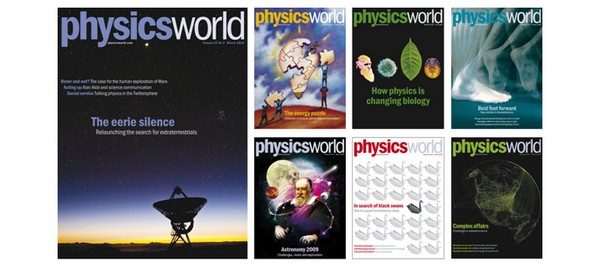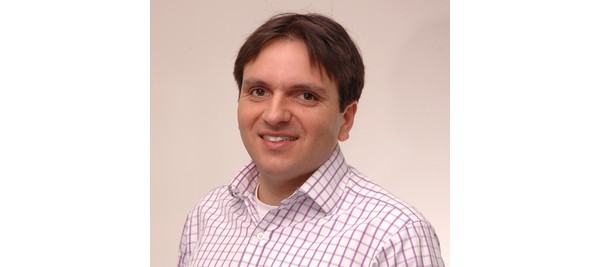Physics World: reporting from the frontiers of science
e-EPS spoke with Matin Durrani, the editor of Physics World, the membership magazine of the UK Institute of Physics.
| Physics World |

|
| Past covers of Physics World. |
Who is Physics World aimed at?
The readers of Physics World, and its sister website physicsworld.com, all have one thing in common: a love and passion for physics – whether they’re using CERN’s Large Hadron Collider to search for the Higgs boson or building a new radiation-therapy machine to treat cancer patients.
Ranging from first-year undergraduates, via researchers in industry, to school teachers and university academics, Physics World’s readers have all either studied – or are studying – physics to degree level. As all of our editorial staff are trained physicists themselves, there is an incredibly clear editorial focus – I like to think we know instinctively what motivates and makes readers tick.
As editor, it’s my job to ensure that our coverage of cutting-edge, technically complex science ticks all of the boxes for this broad and demanding readership.
What are your editorial objectives?
Physics is a global enterprise, and we cover physics wherever it is happening via exclusive, off-diary news and analysis from a pool of correspondents across Europe as well as Australia, China, Japan, India, South America and the United States.
We also commission big-name researchers for their first-hand experiences at the frontiers of science – covering everything from the fundamental (like the quest for invisibility cloaks) to the applied (like revolutionizing retinal implants). This compelling mix is reinforced by high-end production values and extensive use of eye-catching multimedia, photography and custom illustration from our in-house graphics studio.
| Matin Durrani |

|
| Matin Durrani, Physics World editor. |
How do you and the team keep up to speed with the latest science?
The editorial team is encouraged to get ‘out there’ and to build up our network of contacts across the community. Over the past few months, for example, news and features staff have been dispatched to the main scientific conferences — including the American Physical Society’s March Meeting, in Dallas, and the recent EPL25 Frontiers of Physics Symposium, in Munich – as well as to a string of ‘A-list’ research institutions, including CERN, in Switzerland; Harvard University, in the US; and the European Synchrotron Radiation Facility, in France.
I’ve also been breaking new ground and developing our editorial reach with week-long road-trips of my own to both Australia and China.
What about your strategy for online and digital publishing?
Things are moving incredibly fast in online and digital. That creates challenges – but also big opportunities – for editors and publishers. Here at the Institute of Physics, the Physics World editorial team has successfully embraced what’s dubbed ‘convergence journalism’, with a unified approach to story-telling that spans print, online, digital and multimedia.
A fantastic, relaunched digital version of the magazine is now available online and via iphone, ipad and Android tablet devices, allowing our content to be read, shared, listened to, saved and even translated. We have also stepped up our ‘cross-platform’ approach to forward-planning of print, online and multimedia content.
The April ‘Centenary of Superconductivity’ special issue, for example, was enriched by a series of online video interviews with leading superconductivity experts – including Nobel-prize-winner Frank Wilczek (filmed in Dallas by our multimedia team) – while the digital issue was made open-access with over 9500 new users so far registering to access the .pdf download.
We’ve also enhanced our incredibly popular webinar strand – compelling, general-interest online audio lectures from big-name physicists – while our social-media efforts have led to Physics World’s presence on Twitter and Facebook exceeding 12,000 and 3600 followers respectively.
Just last month, we had some great validation for our online/digital strategy when physicsworld.com scooped “Best specialist site for journalism” at the inaugural Online Media Awards, sponsored by the UK Press Association.
In case you missed it, be sure to check out physicsworld.com’s exclusive video coverage of the EPL25 Frontiers in Physics Symposium. The coverage includes interviews with Luisa Cifarelli, president of the EPS, and Michael Schreiber, editor-in-chief of EPL.


